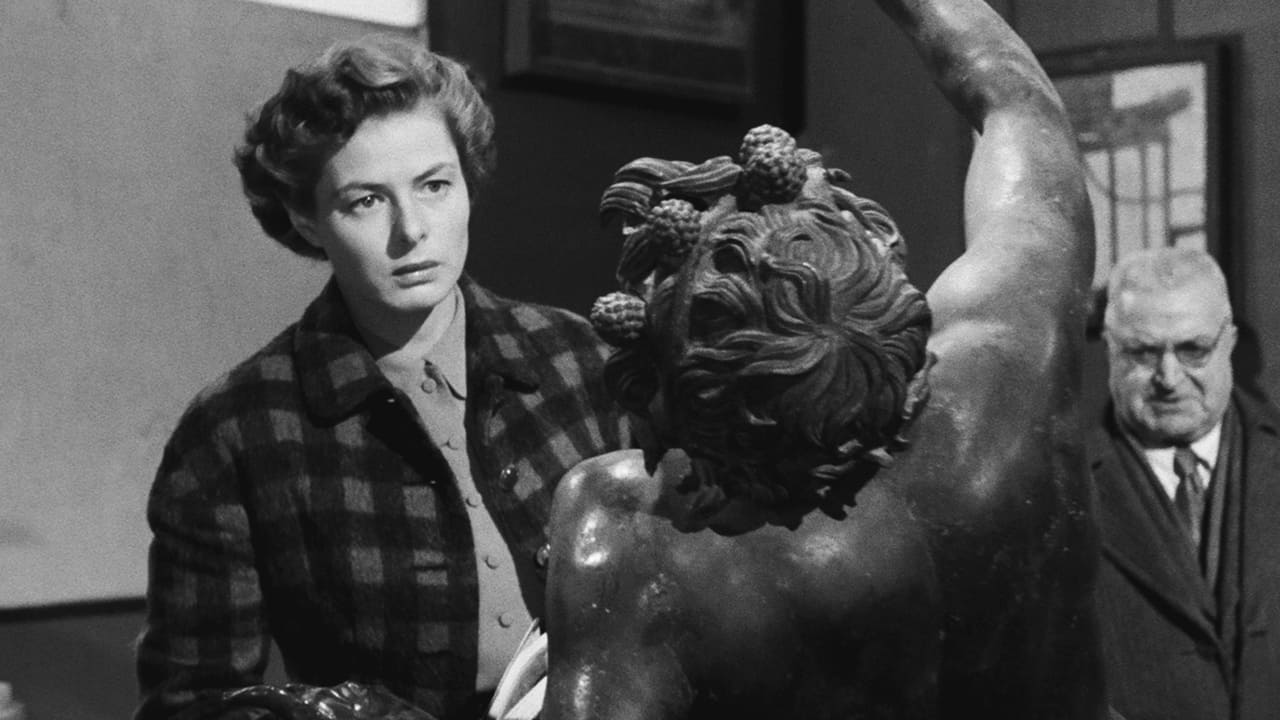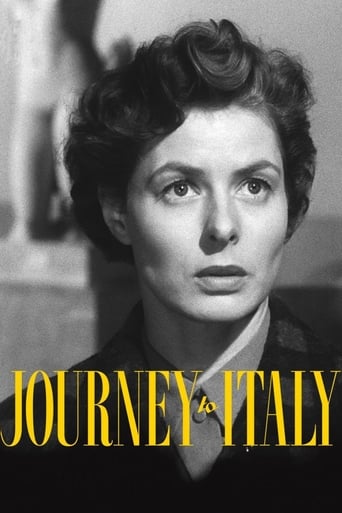



I like the storyline of this show,it attract me so much
View MoreExactly the movie you think it is, but not the movie you want it to be.
View MoreThe tone of this movie is interesting -- the stakes are both dramatic and high, but it's balanced with a lot of fun, tongue and cheek dialogue.
View MoreStory: It's very simple but honestly that is fine.
An unhappily married wealthy couple drive to Naples to dispose of a deceased uncle's villa. He is dry as an old bone, completely unfeeling around his wife, while she grows more and more upset as time passes at their lack of connection and romance. Eventually they decide to get a divorce, before the final scene where they abruptly change their mind and declare their love for one another, without any indication as to how they reached such a conclusion. The film does a pretty good job of avoiding melodrama until that point, but a more insipid ending you couldn't imagine.The lack of any human warmth in this film makes it an emotionless affair, though it does manage an inviting mood thanks to the wonderfully scenery. Set mostly in sunshine, mountains rise in the background, oceans sit on the horizon, stony streets are woven, and we get a travelogue of the southwest coast of Italy - Naples, Capri, Pompeii - volcanic smoke, catacombs, and marbled statues. Rossellini does well to pull back from the actors and let these locations breathe fresh life into a relationship of stale air. Learning foreign history and observing foreign life pass around them, the mood is that of disconnect - though there is a sense of wonder and searching for our place within it all. Certain nods to the macabre along the way impart some vague thematic elements, though I empathise with any who thought this was made by a tourism promotion company.
View MoreJourney to Italy is a truly beautiful, and utterly relatable tale of two very different people, stuck in a defunct marriage, finding themselves, and love, in Italy. The city of Naples is displayed with utter class here--this movie is as much a call for tourism, as it is a love story. Many great museums, as well as macabre catacombs are displayed, as Katherine seeks distractions from her failing marriage. Rossellini knows he's got a gorgeous backdrop to tell his story, and doesn't waste it for a second. The conclusion had me moved to tears. If you get a chance to see it on Criterion's gorgeous blu-ray, absolutely give it a watch. It's well worth it.
View MoreThis movie was playing during an Ingrid Bergman 100th birthday series. Since I had never seen any of her films with her then-husband, Roberto Rossellini, and since I also really like George Sanders, I decided to see "Journey to Italy."My first thought, uncharitable as it may be, was that Bergman made a mistake when she became involved with Rossellini, and went into exile from Hollywood. "Journey to Italy" certainly wasn't lacking in realism, either in the conflicts between the couple whose story was featured, or in the footage of Pompei and Naples, but it felt unfinished and rough, lacking the polish of the, I believe, far superior films Bergman made in Hollywood, such as "Notorious," "Gaslight," "Casblanca," and the others.There's a lot to be said for movies that have polish. I essentially adopt the Hitchcock view of film-making. He once said, "Some directors make films that are slices of life. Mine are slices of cake." I believe art, and that includes cinema, shouldn't merely reflect reality, it should reflect on and heighten reality, otherwise it might as well be journalism or a documentary. While the conflict between the couple felt real and plausible, and their shared experience in the ruins of Pompei was insightful, I did not feel much moved as I watched those scenes. The insight gained was essentially abstract and intellectual. However, I did think that the film resembled a couple of other noted "marriage" movies - "Two for the Road," and "The Awful Truth." I have to say I think both are superior to "Journey to Italy," in spite of the intriguing cast and premise.
View MoreIt's another "Voyage to Italy" that lead me to that one, Martin Scorsese's documentary recollecting the Italian classics that forged his inspiration, among them was that intriguing Rosselini movie starring George Sanders and Ingrid Bergman. It didn't have a De Sica vibe but there had to be a reason Marty put it on his to-watch list.Indeed, "Voyage to Italy" is another of these raw diamonds like only Italian Neo-realism could produce. It starts with a couple coming from London to Napoli to sell a villa belonging to a recently deceased uncle. There's no further development in that element of the plot, the focus is on the relationship between Alex and Katherine Joyce, and from the first exchanges, we understand that something is not going well. And that journey in Italian countryside might affect their relationship, for better or worse.Fittingly, Ingrid Bergman gives an eerie 'Bergmanian' feeling to these first interactions, an odd mix of personal involvement and total detachment that you can only spot when you're married. I've been married for four years now, and I can tell when a husband and a wife only talks to break the silence. This is how dialogue is crucial in the movie, what they say is secondary to the story, it's all in the 'how they say it'.What we take from the exposition though is that this highly educated, upper class, a bit worn out, couple never did anything together besides marrying: no children and no travels. So, this trip to Italy might be a good medicine against the monotony that kept poisoning their couple or the deathblow on an agonizing marriage. She admires poetry, Mediterranean idleness and fascination for sweet and simple things; he abhors this laziness, so common among little people. While they converged to the same point, they couldn't be more divergent everywhere else. And it doesn't come as a surprise when they choose to visit Italy separately.Katherine visits museums, temples, she's fascinated by art, by these looks on marble statues, by these colossal relics where men identified imitated Gods, saw things in big, and she seems to remember how little his life has shrunk to. The delight of these visits is also spoiled by the old guides whose nonchalant and rapid tone make impossible any form of contemplation or meditation on such majestic beauty, anything to forget her marital boredom.Alex is more drastic; he simply meets other women, spending as many pleasant evenings as he can. After all, didn't he see Katherine being courted by all these luscious Italian bourgeois during a party and let it go? Did she or did she not intervene when he was talking to an old feminine acquaintance the night before? Alex rhymes with complex, his language consists on hurting to provoke a reaction, and bizarrely, a non-reaction is much more displeasing. At the end, they never acknowledge having fun and never really talk. Why? In fact, both are looking for ways out. It's obvious that Katherine needs Alex more than a guide. And so does Alex. During a crucial night, he meets a prostitute and takes her for a ride, she then confesses in the car that she was about to commit suicide and needed someone to spend the night. Alex doesn't accept as if he felt it could be that mistake he might regret it forever, and no girl yet would be worth such sacrifice. Yet when he's back to the hotel, he wastes another opportunity to let his heart talk.The day after, Katherine goes for a last trip to the catacombs, discovering meanwhile the joyful population of Napoli, full children and pregnant women, everything she lacks. Her guide, a lady who works at the hotel, notices the same because she can't have children. As a married man, I remember before my wife got pregnant, we couldn't help noticing those who were. Loveless and childless people have the eye for such things. And Katherine doesn't even have the luxury to love Alex through a child.And that boiling frustration explodes when she's confronted again to an infuriated Alex and the argument escalates to a "let's divorce" that sounds the death knell of their marriage. But they have no time to digest the decision as they're coerced to visit Pompeii's ruins. And in a heart-pounding moment, we follow the disinterment of a corpse, followed by another one, a husband and a wife, literally rooted to the spot by a sudden torrent of lava and ashes. A moved Katherine leaves the site, followed by Alex, who'll admit later the sight hit a sensitive chord too.In their way back, they're blocked by one of these typical Italian crowed processions, so they get out of the car. And while the taboo word was spoken, Katherine felt even more uncomfortable than she was at the beginning, and God, how true to life it is. Couples are weird you know, once you talk of separation, this is when you realize that there's something that deeply ties you to that person, more than love, a sort of moral commitment and visceral need to stay together. Alex still believes it is the right choice, probably exhilarated by the perspective of enjoying life, too short to be drowned in an ocean of unhappiness.And in one of the greatest twist endings, Katherine is literally swept along the human wave and literally taken out of Alex' hands. Alex feels then how precious she is for him and goes save her and they embrace and there's no need for words anymore. We know they lanced the boil. And I wish this could be the last image of the film, the conclusion of an ordinary story speaking so many true statements about marriage.Indeed, there's more to discover in marriage than the country you visit as you might feel even more estranged to the beloved one than you are in the country.
View More